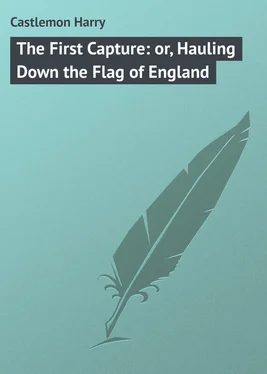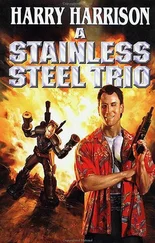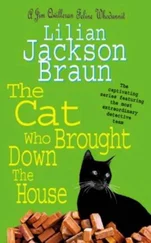Harry Castlemon - The First Capture - or, Hauling Down the Flag of England
Здесь есть возможность читать онлайн «Harry Castlemon - The First Capture - or, Hauling Down the Flag of England» — ознакомительный отрывок электронной книги совершенно бесплатно, а после прочтения отрывка купить полную версию. В некоторых случаях можно слушать аудио, скачать через торрент в формате fb2 и присутствует краткое содержание. Жанр: foreign_prose, на английском языке. Описание произведения, (предисловие) а так же отзывы посетителей доступны на портале библиотеки ЛибКат.
- Название:The First Capture: or, Hauling Down the Flag of England
- Автор:
- Жанр:
- Год:неизвестен
- ISBN:нет данных
- Рейтинг книги:4 / 5. Голосов: 1
-
Избранное:Добавить в избранное
- Отзывы:
-
Ваша оценка:
- 80
- 1
- 2
- 3
- 4
- 5
The First Capture: or, Hauling Down the Flag of England: краткое содержание, описание и аннотация
Предлагаем к чтению аннотацию, описание, краткое содержание или предисловие (зависит от того, что написал сам автор книги «The First Capture: or, Hauling Down the Flag of England»). Если вы не нашли необходимую информацию о книге — напишите в комментариях, мы постараемся отыскать её.
The First Capture: or, Hauling Down the Flag of England — читать онлайн ознакомительный отрывок
Ниже представлен текст книги, разбитый по страницам. Система сохранения места последней прочитанной страницы, позволяет с удобством читать онлайн бесплатно книгу «The First Capture: or, Hauling Down the Flag of England», без необходимости каждый раз заново искать на чём Вы остановились. Поставьте закладку, и сможете в любой момент перейти на страницу, на которой закончили чтение.
Интервал:
Закладка:
Harry Castlemon
The First Capture; or, Hauling Down the Flag of England
CHAPTER I
THE BATTLE OF LEXINGTON
It happened on the morning of the 9th day of May. The little village of Machias in the far away colony of Maine was lively enough as far as fishing towns go, but on this particular time it was in a regular turmoil. Men had jumped up leaving their breakfast half eaten and ran out bareheaded to gather round a courier, who, sitting on a horse that had his head down and his flanks heaving as if he were almost exhausted, was telling them of a fight which had occurred just twenty days before. There was nothing to indicate that the men were excited except their pale faces and clenched hands, but the looks they turned upon one another had a volume of meaning in them. What had the messenger to communicate that had incited such a feeling among those who listened to him? He was describing the battle of Lexington which had been fought and won by the patriots on the 19th day of April. We did not have any telegraph in those days, and the only way the people could hold communication with one another was by messengers, mounted on fleet horses, who rode from village to village with the news.
The courier was so impatient to tell what he knew that he could not talk fast enough, but the substance of his story was as follows:
General Gage, the commander of the British troops who were quartered in Boston about this time, had become a tyrant in the eyes of the people. When spring opened he had a force of three thousand five hundred men. Boston was the headquarters of the rebellion. He determined with this force to nip the insurrection in the bud, and his first move was to seize and destroy the stores of the patriots at Concord, a little village located about six miles from Lexington. To carry out this plan he sent forth eight hundred men under the command of Colonel Smith and Major Pitcairn with orders to "seize, burn and otherwise render useless" everything in the shape of munitions of war that they could find. He supposed he went about it secretly, but the ever-vigilant patriots were awake to all his movements. A watch was established at Concord, and everywhere the minute-men were ready with "burnished muskets, fixed bayonets, and well-filled cartouches."
They left Boston about midnight, but it so happened that the minute-men became aware of their expedition almost as soon as it was ready to start. Paul Revere was there and ready to undertake his famous midnight ride. No sooner was the trampling of soldiers heard than two lights were hung in the steeple of Christ Church in Charlestown. Paul Revere saw the lights, and he forthwith mounted his horse and started to carry the warning to every village in Middlesex. 1 1 "He said to a friend, 'If the British march By land or sea from the town to-night, Hang a lantern aloft in the belfry arch Of the Old North Tower as a signal light – One if by land, two if by sea, And I on the opposite shore will be Ready to ride and spread the alarm Through every Middlesex village and farm For the country folk to be up and to arm.'"
The British did not see the beacon fire blazing above them, but marched away silent and still, arresting everybody that came in their way "to prevent the intelligence of their expedition being given."
As the day began to dawn in the east the British reached Lexington, and there they found a company of minute-men gathered on the green. To say that they were amazed at the sight would be putting it very mildly; but Major Pitcairn, after a short consultation with his superior officer, rode up and flourished his sword as if he meant to annihilate the minute-men then and there. His officers followed him and his troops came close behind him in double quick time. But the patriots stood their ground, and the redcoats shouted angrily at them —
"Disperse, you villains! Lay down your arms! Why don't you disperse, you rebels?"
But our men had not come out there to be dispersed by shouting. Utterly ignorant of the ways of civilized warfare they continued to hold their ground, and for a time it looked as though there was going to be bloodshed sure enough. Major Pitcairn did not care to come too close to them but wheeled his horse, discharged his pistol and shouted "Fire!" and the British obeyed him. The front rank fired, and when the smoke cleared away, seven men, the first martyrs of the Revolution, were found weltering in their blood. That was too much for the patriots. They did not suppose that the British were going to shoot them down like dogs. They scattered in every direction, and the redcoats, having nothing further to oppose them, kept on and destroyed the stores.
"Colonel, I don't like the way those rebels retreated," said Major Pitcairn, as he kept a close watch upon the neighboring hills. "They fell back as though they would come again."
"If they were soldiers we would know how to take them," replied Colonel Smith. "But being rebels, we have nothing further to fear from them."
Major Pitcairn, however, kept a bright lookout, and very soon he became uneasy at the rapidity with which the militia increased in numbers. He called the attention of his superior to it, and very shortly the latter gave the order to retreat; and it was not a moment too soon. The whole region flew to arms, for remember that Paul Revere had aroused to vigilance the inmates of every house he came to, and from every one there came a man or boy who was strong enough to handle a rifle, and hurried to the help of his countrymen. It seems that Colonel Smith had more to contend with than mere rebels. It appeared, too, that one who afterwards wrote about that battle was there to have seen it for he tells us in his poem:
"And so through the night rode Paul Revere,
And so through the night went his cry of alarm
To every Middlesex village and farm —
A cry of defiance and not of fear,
A voice in the darkness, a knock at the door,
And a word that shall echo for evermore.
For, borne on the night-wings of the Past,
Through all our history to the last,
In the hours of our darkness, peril, and need,
Will the people waken to listen, to hear
The hurrying foot-beats of that steed,
And the midnight message of Paul Revere."
The minute-men gathered as if by magic. They did not come out and form themselves in line for the purpose of being shot down by the redcoats, but remembering their skulking habits which they learned while fighting the Indians, they hid behind trees, fences, and rocks, in front, flank, and rear, and poured so galling a fire upon the Britishers that if it had not been for reinforcements not one of those eight hundred men would ever have reached the city alive. As one of their officers expressed it: "the militia seemed to have dropped from the clouds," and the flower of that British army must have surrendered to those patriots if relief had not arrived. Their retreat was regarded as a defeat and a flight, and at every corner were heard the jeers and mockings of the people regarding that "great British army at Boston who had been beaten by a flock of Yankees." At any rate the jubilee trumpet was sounded proclaiming "Liberty throughout all the land unto all the inhabitants thereof." The power of all the royal governors was broken, from Massachusetts to Georgia.
This was the substance of the news which was brought to Machias twenty days after the fight. The people were both astonished and angry – astonished to know that the British soldiers, who had been regarded as invulnerable, could be outdone with American bullets, and angry to learn that so many of their friends 2 2 Lossing says: "The British lost 65 killed, 18 wounded, and 28 made prisoners; in all 273. The Americans lost 59 killed, 39 wounded, and 5 missing; in all 103.
should have been killed during their conflict with them.
Интервал:
Закладка:
Похожие книги на «The First Capture: or, Hauling Down the Flag of England»
Представляем Вашему вниманию похожие книги на «The First Capture: or, Hauling Down the Flag of England» списком для выбора. Мы отобрали схожую по названию и смыслу литературу в надежде предоставить читателям больше вариантов отыскать новые, интересные, ещё непрочитанные произведения.
Обсуждение, отзывы о книге «The First Capture: or, Hauling Down the Flag of England» и просто собственные мнения читателей. Оставьте ваши комментарии, напишите, что Вы думаете о произведении, его смысле или главных героях. Укажите что конкретно понравилось, а что нет, и почему Вы так считаете.












